- Home
- Peter Grainger
On Eden Street Page 28
On Eden Street Read online
Page 28
Freeman said, ‘What made you think someone might have gone to the lengths of impersonating a police officer to find you, Michael?’
‘Bitter experience.’
The senior investigating officer smiled and said, ‘OK. Can I take you back to something you said a moment ago? You said, on Tuesday you didn’t know much – that implies you know more now, about why we were looking for you. What do you know, and how?’
This was another dangerous moment. How would Wortley be able to explain knowing about the murder of Neville Murfitt, and how it related to him? There were certain elements of the story that could only have come from a police source, and Freeman would see that immediately.
Wortley nodded and answered her questions.
‘When I first arrived in Kings Lake, I stayed a couple of days at a night shelter. It was a way of keeping off the official radar. Or I thought it was. The bloke who runs it is all right, I mean, he’s a Catholic priest of some sort but you wouldn’t know it to talk to him. We talked a lot one night. Anyway, this morning I went back to see him. I’m not a Catholic, right? I wasn’t making any confession, but…’
Freeman said, ‘You wanted some advice?’
‘I suppose, yeah. It was someone to talk to, someone who’s seen a bit of the world. He filled me in. He told me about what happened to the other bloke, Murfitt. He still had the photos your people left there. I remembered him when I saw them. The first night I stayed there, I talked to him for a few minutes. Joe told me that when the detectives first came they thought it was me who was stabbed – they thought he was me.’
Waters could see Freeman’s mind at work, and he knew if there was anything odd in Wortley’s story, she would find it. And he thought, I hope Michael Wortley did go to see Joe Ritz this morning, because she’ll check, or DI Greene will, there’s nothing more certain than that.
Freeman went further ahead than Waters expected. She said to Wortley, ‘And you realised it was meant to be you.’
It was not a question, and Wortley didn’t respond but he glanced at Waters again. Freeman, meanwhile, was in no hurry. She stared down at the notepad where she had written nothing, and Waters was more convinced than ever that the detective inspector was next door making notes on her behalf. Then she said, ‘Did you tell the… What’s his name, DS Waters, the man at the night shelter?’
He started a little, but there could be nothing at all in his knowing the answer, and so he told her.
Freeman said to Wortley, ‘Did you tell Joe Ritz anything about why you’d come to Kings Lake in the first place?’
‘Some of it. Just in general, no details. I said I was in a bit of bother. He worked out for himself it was a lot of bother.’
‘I see. And he told you to get in touch with us, which is why you’re here now?’
There is a way of repeating things one has been told in an apparently neutral manner, which, nevertheless, suggests in some mysterious way to the person telling the story that he has not been entirely believed, or, at the very least, he hasn’t told the whole truth. Michael Wortley responded as the detective chief inspector intended – he told her a little more.
‘Not just like that. He asked me a few questions, just like you’re doing. He was interested in my time in the Army. He made a phone call and spoke to someone – said he wanted some advice before he gave me any. But yeah, it was his idea to come in. He said it was the best way to get closure on it for me, and for the poor sod who got stabbed instead of me.’
Freeman had rattled him a little, and Waters knew where she was going next. She said, ‘Father Ritz made a phone call? Do you know who he called, Michael?’
‘No. He took his phone out into the hall.’
‘How long did the call last?’
‘Four or five minutes, I suppose. Does that matter?’
Freeman turned to Waters and said, ‘We didn’t get a call this morning, did we? No one on the team?’
He didn’t think so – he was sure it would have been mentioned. The DCI said to Wortley, ‘And you’ve no idea who Father Ritz spoke to about your situation?’
Wortley was finding the questioning somewhat amusing now. He shrugged and opened his palms, as if to say, search me. Waters watched the man rather than Freeman; he didn’t want her looking back at him because she might catch sight of it, the realisation he had just experienced. That phone call…
Freeman said, ‘But anyway, Michael, after the phone call, Father Ritz came back in and advised you to contact Detective Sergeant Waters, here. Yes?’
A nod, and despite Wortley’s best efforts, a glance in the sergeant’s direction.
Freeman said, ‘Specifically Detective Sergeant Waters?’
‘Yes, again.’
‘He didn’t just say he thought you should hand yourself into the police?’
Then she looked at Waters and said, ‘You must have made quite an impression, sergeant. On Brother Joseph Ritz…’
Wortley sensed something here. He said to Waters, ‘He had your card. On his desk with the photos. He picked it up and said, go to the station and ask for this detective. Which is what I did. Not really a mystery, is it?’
Freeman said, ‘No, it isn’t. Thank you again for coming in to speak to us. We’ll leave you here for a moment while I speak to my team. Then someone will be back to talk to you about the day you met Neville Murfitt – that’s our priority here in Kings Lake.’
The two of them went into the recording room where Greene was writing labels and Maya was making digital copies of the interview file he had just recorded. Freeman said, ‘This Joe Ritz needs speaking to today,’ and Greene answered, ‘Serena’s on her way there, ma’am. I’ve told her to get what Wortley said to him, word for word, in case we miss anything here.’
Freeman said, ‘Right. And tell her to ask about the phone call Ritz made. What was that about? Who else knows anything about this?’
Waters wondered whether he should call Serena himself, and warn her. She’d work it out, if it came to it, wouldn’t she?
Greene was saying, ‘… let Regional know we have him, ma’am?’
Freeman was in top gear now, and Waters kept quiet – he’d experienced this once before.
She said, ‘Absolutely, DI Greene, that’s our top priority. So, what’s the time now? 13.12. It’s critical that we let Regional know where Michael Wortley is by – shall we say, 17.00 hours?’
Tom Greene nodded – ‘That should give us time to get everything we need, ma’am.’
Freeman was intent on gaining every possible scrap from Michael Wortley that might help prosecute the case against Neville Murfitt’s killers. She knew that once Wortley was in Norwich it might be a long while before they saw him again, if they ever did.
She turned to Waters and said, ‘Well done. You’ve almost redeemed yourself in just forty-eight hours. You lost him and then, as if by magic, he finds his own way back to you.’
He took that in silence, and waited for the instructions that would be coming from Detective Inspector Greene in the next thirty seconds. This might all unravel yet.
“Not really a mystery, is it?” Wortley had said. Well, no, unless you allow for the fact that the only card on Joe Ritz’s desk belonged to Detective Constable Serena Butler. Waters hadn’t left one.
Chapter Twenty-Seven
‘He’ll be asleep on the sofa, the end nearest the radiator. He’s not supposed to be up there, and when he hears the key in the lock, he’ll get into his basket. But I can always feel the warm spot where he’s been.’
Katherine Diver was looking at a photo of Ben on Miriam’s phone. She showed it to the other people around the table, and her brother Jason mimicked her and said he, that is Ben the guide dog, was absolutely adorable. As far as Waters knew, Jason was the only person still alive who could get away with teasing his terrifying sister. But Katherine had taken a seat next to Miriam as soon as they arrived at The Blue Note that evening, and now, instead of responding to her brother, she was asking Miriam mo
re questions about what Ben could do and how he had been trained. Waters had known Katherine Diver for more than three years, including a short but explosive few weeks as a couple, yet he’d had no idea she was fond of animals.
It had been an odd, tense afternoon at the station. Everything they’d been working on for the past two days had come to a sudden halt with the appearance of Michael Wortley. He’d been interviewed for more than two hours by Freeman and Greene, which meant that for long periods, the detective sergeants and constables had been left to their own devices. Time had not been wasted but there had been more opportunity than usual for conversation.
Waters had asked Serena about her meeting with Joe Ritz, and about the telephone call. He didn’t say directly to her whom he thought had been on the other end of the line, but she’d come to the same conclusion herself. She said, ‘Joe wasn’t prepared to say. I got the feeling that whoever it was he’d been speaking to had said it might be better if their name was kept out of it.’
‘Better for whom?’ Waters said, and Serena had answered, ‘Us, of course.’
At four-thirty, Freeman had held a briefing. As far as she could tell, Michael Wortley was being open with them, and they had some further information which would be the focus of next week’s work. But for now, she said, go home and take a well-deserved break.
John Murray had asked what was happening to Wortley. Freeman said, ‘Regional know he’s here. They’re sending someone this evening. I’ll be keeping him company until that’s sorted.’
Denise Sterling had offered to stay on, her children being with their father this weekend, but Freeman declined, though she seemed grateful. And Waters had thought, she wants a little time alone with Wortley, a little informal time, without even DI Greene in the room. But it was Greene himself who had interrupted that thought when he said to Waters, ‘Don’t you have a dentist’s appointment in twenty minutes?’
There was just a piano on the small stage this evening. One of the joys of the jazz club as far as Waters was concerned, was the absence of a programme or even a plan. There was live music most evenings but until one walked through the door, what it might be, or who or how many might be playing it, were usually complete unknowns. It just sort of happened, and more than once he’d seen people called out of the audience to perform with others on stage, sometimes for just a single number. The thought took him back to a memory, of course, to Smith going up onto the stage of the Pinehills Social Club all those years ago. He’d played ‘Old Love’ by Eric Clapton, and afterwards Waters had walked back to the caravan with Clare. It’s strange how good memories can make you sad.
Tonight, inside Miriam’s flat for the first time, he’d seen another piano. When she asked what he was looking at, he told her and said it was taller than he expected, for an upright piano. She had called back from another room, ‘Longer strings! That’s all pianists dream of – longer strings.’
Lifting the lid, he’d read “Yamaha U3”. There had been the temptation to touch the keys, to see if he could hear the difference made by longer strings, but that would have been an intrusion into something that clearly mattered a great deal to her. Arranged on shelves to both sides of the piano were files of music. Waters took one down and opened it. He’d expected Bach or Mozart but the title was Modern Jazz Classics For Piano. Instead of the conventional stave notation, the music was printed in Braille on sheets of card, the pages covered with hundreds of tiny raised dots arranged in horizontal lines. He could not imagine how anyone’s fingertips could convert this to music. And if you must touch each individual symbol, how can you be playing the instrument at the same time?
When she returned, he asked her.
Miriam said, ‘You can’t. Lots more memory is involved for blind musicians. Learn a phrase, then the next phrase, and the next, remembering them all in sequence. It takes longer, but the ear is an amazing thing. It learns patterns very quickly, and most classical stuff is all about patterns.’
Waters said, ‘But I’m looking at pages of modern jazz classics. I’m no expert but surely the whole point of jazz is-’
‘Improvisation? So, this is where it gets interesting. Classical pianists do improvise – they play the same piece slower or faster, with different emphasis. There are hundreds of versions of The Moonlight Sonata, if you know what you’re listening for. But the notes must be played in that one order, or it’s sacrilege. Yes?’
He nodded and then realised he had to speak to show he was following; there was something fierce and impatient about her intelligence.
‘Absolutely, yes.’
‘Are you humouring me?’
She was smiling, but she wanted an answer to that as well, and he said, ‘No, but it’s all new to me. Struggling to keep up. How is jazz different?’
Miriam took a moment, and the detective in Waters – a Level Two interviewer now, in his own right – realised she was also taking a decision about him; was he genuinely interested, was he worth this conversation?
Then she said, ‘In jazz, the tune is still there. If you strip out everything else, it’s always there. But it’s what you do in between and around those notes that matters. The departures, the near-misses, the almost-played-it-but-not-quite-yets, the sense of relief when the remembered phrase reappears but then it’s gone again, like a figure in a dream…’
She had been quite close to him. He could have reached out and touched her but did not do so. Other girls can see that moment coming, the first touch, and a man can see in their own eyes whether it is the right thing, but with Miriam? The hand would come without warning, and he dreaded the thought of her flinching away from him.
She said, ‘Did you know Louis Braille was a musician? Not many people know that. But I won’t lie to you – learning braille music is a right pain. It’s not easy to get hold of, either, but I belong to an exchange group online. I’ve transcribed a few things for other people, and get the things I want in return. A couple of years ago I started listening to jazz, and…’
‘And?’
‘I’m lucky. I can play by ear, and I only need to hear a tune once.’
She reached out, took the file he was holding, closed it, felt the symbols on the spine and returned it to the correct place on the shelf. She was inches from him, and must know it. But she still hadn’t answered his question.
‘And?’
‘Are you always this persistent, detective sergeant?’
‘Yes.’
‘All right. I’ll answer if you agree to answer one question of mine.’
Waters agreed, of course, and she said, ‘Jazz sets you free, creatively. Sometimes it can go horribly wrong because there are still rules, but they’re not printed on paper any more. You make your own rules. If it sounds right, then it is. If it feels right, then it is. I spent most of my life breaking rules, especially the ones that say a blind person can’t do this. My father says there is nothing more dangerous in the world than a blind anarchist. I should tell you now, by the way, that he’s a very important lawyer – at least, that’s his opinion. And then I realised you can’t even have anarchy without rules. You can’t have a glass of wine without the glass. You can’t play chess without a board that has sixty-four squares. Some things are fundamental.’
She had given him a glimpse of her true self, he thought; creative, clever and independent. What need had she of him? What did he have to offer in return? Those were not questions he could quickly answer, and so he said, ‘What did you want to know?’
‘Do I look all right?’
It sounded almost comical after her preceding words, and she sensed his amusement. She said, ‘It’s not vanity! If I’m going out alone, I don’t worry too much, but if I’m with someone I don’t want to look a mess. You learn to cope with a lot of embarrassment but there are limits. For example, I have two blouses with identical labels – I’m wearing the blue one, aren’t I?’
‘Yes. What colour’s the other one?’
‘Pink. Completely wrong for a good resta
urant and a club.’
She moved away, comfortable in her own space. She went to the sofa, where for some reason she rearranged cushions at one end of it, the end closest to the wall and a radiator – the cushions were piled into a little heap. She was almost ready to leave and said she’d fetch a coat. Waters looked around the room then, and saw how much like his own place this was; little decoration and no clutter, nothing in the way near floor level and the furniture placed so that with a mere passing touch she could find her way around. Every time his mother visited the flat, she’d say, ‘It’s still a bit bare, Chris. I’ll get you some more family photos done…’ Miriam had no photos, no picture of a man who looked like an important lawyer, no paintings, no posters from her university days. Blind, she had no need of them. What was his excuse?
But there was nothing either to hint at the excesses of her times with the boyfriend who died. Erich? Waters’ eye had been professional for a moment but nothing caught his attention. He found himself thinking then that this mattered, but he wasn’t sure why.
Katherine was saying, ‘Yes, he does a lot of thinking. We’re all used to it, Miriam. You just need a pastime while you’re waiting for him to come back. I’ll take you, I need to go myself.’
Katherine stood up and held out her arm. Miriam took it and the two women made their way across the half-empty space – The Blue Note wasn’t busy for a Friday night. Waters and Jason watched them go, and then Jason said, ‘She’s stunning. Where did you find her?’
‘In a flower shop.’
OK… Novel. I’ve never thought of looking anywhere like that. Katherine’s taken to her.’
Their table was close to the small stage. Out in the gloom, a couple of voices cheered and somebody clapped. Someone was on their way forward, the retired schoolteacher-type whom Waters had heard play more than once. And every time Waters had heard him, the man had been wearing that same pullover, surely, green with the leather patches at the elbows. No doubt all performers have their rituals. But this old man could play. It was jazz piano good enough to sit and listen to but not so demanding you couldn’t talk if the need arose, like those wonderful live recordings of Bill Evans. Headphones on, eyes closed, all around you is the hum of low conversation, the chink of glasses and perhaps even the scent of cigarette smoke. Those were the soundtracks of a bygone age.

 Persons of Interest
Persons of Interest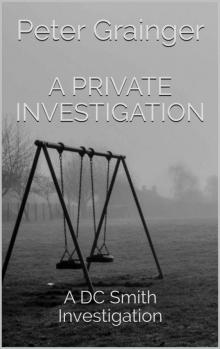 A Private Investigation
A Private Investigation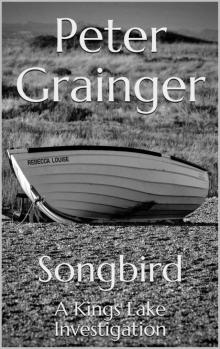 Songbird
Songbird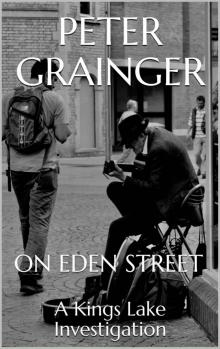 On Eden Street
On Eden Street An Accidental Death
An Accidental Death Time and Tide
Time and Tide An Accidental Death: A DC Smith Investigation
An Accidental Death: A DC Smith Investigation In This Bright Future
In This Bright Future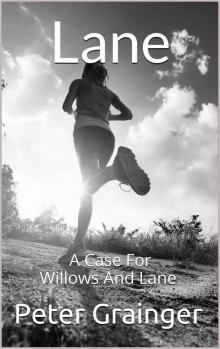 Lane: A Case For Willows And Lane
Lane: A Case For Willows And Lane The Rags of Time: A DC Smith Investigation
The Rags of Time: A DC Smith Investigation Luck and Judgement
Luck and Judgement Persons of Interest: A DC Smith Investigation
Persons of Interest: A DC Smith Investigation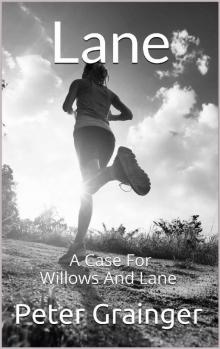 Lane
Lane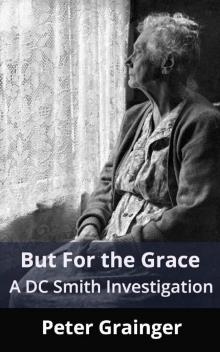 But For The Grace
But For The Grace Time and Tide: A DC Smith Investigation
Time and Tide: A DC Smith Investigation In This Bright Future: A DC Smith Investigation
In This Bright Future: A DC Smith Investigation The Rags of Time
The Rags of Time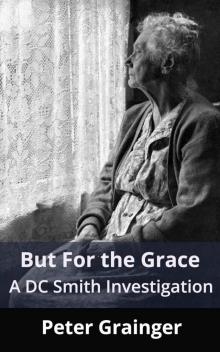 But For The Grace: A DC Smith Investigation
But For The Grace: A DC Smith Investigation Luck and Judgement: A DC Smith Investigation
Luck and Judgement: A DC Smith Investigation